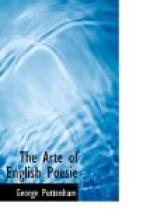Omnia sunt risus, sunt puluis, & omnia nil sunt.
Res hominum cunctae, nam ratione carent.
Thus Englished,
All is but a iest, all daft, all not worth two peason:
For why in mans matters is neither rime nor reason.
Now passing from these courtly trifles, let vs talke of our scholastical toyes, that is of the Grammaticall versifying of the Greeks and Latines and see whether it might be reduced into our English arte or no.
CHAP. XII.
How if all maner of sodaine innouatians were not very scandalous, specially in the lawes of any langage or arte, the use of the Greeke and Latine feete might be brought into our vulgar Poesie, and with good grace enough.
Now neuerthelesse albeit we haue before alledged that our vulgar Saxon English standing most vpon wordes monosillable, and little vpon polysillables doth hardly admit the vse of those fine inuented feete of the Greeks & Latines, and that for the most part wise and graue men doe naturally mislike with all sodaine innouations specially of lawes (and this the law of our auncient English Poesie) and therefore lately before we imputed it to a nice & scholasticall curiositie in such makers as haue fought to bring into our vulgar Poesie some of the auncient feete, to wit the Dactile into verses exameters, as he that translated certaine bookes of Virgils Eneydos in such measures & not vncommendably: if I should now say otherwise it would make me seeme contradictorie to my selfe, yet for the information of our yong makers, and pleasure of all others who be delighted in noueltie, and to th’intent we may not seeme by ignorance or ouersight to omit any point of subtillitie, materiall or necessarie to our vulgar arte, we will in this present chapter & by our own idle obseruations shew how one may easily and commodiously lead all those feete of the auncients into our vulgar language. And if mens eares were not perchaunce to daintie, or their iudgementes ouer partiall, would peraduenture nothing at all misbecome our arte, but make in our meetres a more pleasant numerositie then now is.




